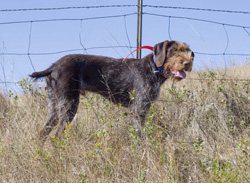German Wirehaired Pointers are strong, medium-sized dogs. The breed's outer coat is harsh, wiry, straight, and flat lying, and the undercoat is dense and works to insulate against cold during winter. The eyebrows are straight, and the whiskers and beard are of medium length. The coat of German Wirehaired Pointers must be liver and white in color, but any pattern or combination of these colors is acceptable. These dogs have oval, brown, medium-sized eyes and rounded ears. They measure 22 to 26 inches tall at the shoulder and weigh 45 to 75 pounds.
Today, these dogs remain popular hunting dogs, but they are primarily used as companion animals in the United States due to their intelligence, loyalty, protective instincts, and easy-going natures.
A multi-purpose, versatile, and loyal breed, German Wirehaired Pointers make great hunting dogs and excellent companion animals. They crave companionship and attention and get along well with children. This breed is very active and energetic and requires regular exercise to remain healthy and happy.
The German Wirehaired Pointer's most distinctive feature is its functional wiry coat. This harsh, double coat is water-repellent and weather-resistant, and it helps make these dogs such impressive hunting dogs on land and in water.
German Wirehaired Pointers are attentive and loving and make great companion animals for families. They may be aloof with strangers, but they are never mean or unfriendly. These dogs are eager to please and very loyal, and they have protective natures that make them good watchdogs.
These highly intelligent dogs are creative thinkers and may get themselves into trouble if left alone for long periods. They need physical and mental stimulation to keep them happy and healthy. At least an hour of exercise every day is necessary, and free time to run and roam is also important. If these dogs spend any time outdoors while unsupervised, they should be contained inside a secure fence. Otherwise, they are likely to escape their yard and hunt birds or small prey.
Because of their tendency to play rough, these boisterous dogs need training if they are to live in homes with small children. They are ideally suited to active families with older children and plenty of free time.
German Wirehaired Pointers are a generally healthy breed, but they are at increased risk for certain health conditions that can shorten or negatively affect life. Common health problems in this breed include congenital hip dysplasia, elbow dysplasia, ear infections, Von Willebrand Disease, and certain eye diseases, including progressive retinal atrophy and entropion.
Being overweight or obese increases the risk of cancer, diabetes, arthritis, heart disease, and other conditions in dogs. Regular exercise and proper nutrition is vital to the health of German Wirehaired Pointers and can prevent obesity and related complications.
German Wirehaired Pointers typically live 14 to 16 years, provided they receive routine veterinary care and standard vaccinations and are kept at a healthy weight throughout life.
German Wirehaired Pointers are easy to train, but their intelligence means they're likely to put their own spin on rules or find loopholes when it suits them to do so. They are also very strong-willed. It is key to consistently enforce rules and use positive reinforcement techniques, such as food and praise rewards, for the best results.
Early socialization is essential to prevent aggressiveness towards other dogs and animals. The German Wirehair has a strong hunting instinct and may chase or hunt small animals inside and outside the home. These dogs cannot be trusted around unfamiliar cats, pet rabbits, or other small animals.
To prevent the noisiness and other negative behaviors that accompany boredom, it's important to keep these dogs active and occupied. Giving them a job to do will help control their behavior, and regular activity provides an outlet for excess energy. German Wirehaired Pointers also do well in obedience and agility trials.
Although they are year-round shedders, German Wirehaired Pointers don't require much grooming. Brushing once weekly is usually sufficient, although a good brushing every other day may be necessary when shedding is at its worst. Occasional hand-stripping is also important to maintain a neat appearance and healthy coat. Stripping can be done at home or by a professional groomer.
These dogs rarely need bathing. Mud and dirt will usually fall off the coat once it dries, but a bath is needed if the German Wirehair rolls around in something sticky or harmful. Additionally, the paw pads must be checked frequently for stickers, seeds, tar, and other materials that may cause pain or injury. The whiskers should be brushed and cleaned daily to remove food.
The nails need clipping every few weeks to prevent snags, and the ears should be checked regularly for wax accumulation and signs of infection. If redness, odor, discharge, or other concerning signs are present, prompt and professional treatment is indicated. Good dental care is very important, and German Wirehaired Pointers should have their teeth brushed daily to prevent tooth decay and periodontal disease.
German Wirehaired Pointers originated in Germany and were likely developed from a combination of German Shorthairs, Griffons, Pudelpointers, and Stichelhaars to create a tough breed capable of pointing and retrieving both on land and in water. These dogs became extremely popular because of their ability to locate and point game, confront vermin without fear, track wounded game, and retrieve waterfowl from water or land. They were also popular watchdogs and companion animals.
Even though German Wirehaired Pointers are the most popular hunting breed in their home country, they did not gain official recognition there until the 1920s. This is about the same time that the breed made its way to the United States. However, these dogs have not enjoyed the same level of popularity in America as they have in Germany.
Today, these dogs remain popular hunting dogs, but they are primarily used as companion animals in the United States due to their intelligence, loyalty, protective instincts, and easy-going natures.
The American Kennel Club officially recognized the German Wirehaired Pointer in 1959.

